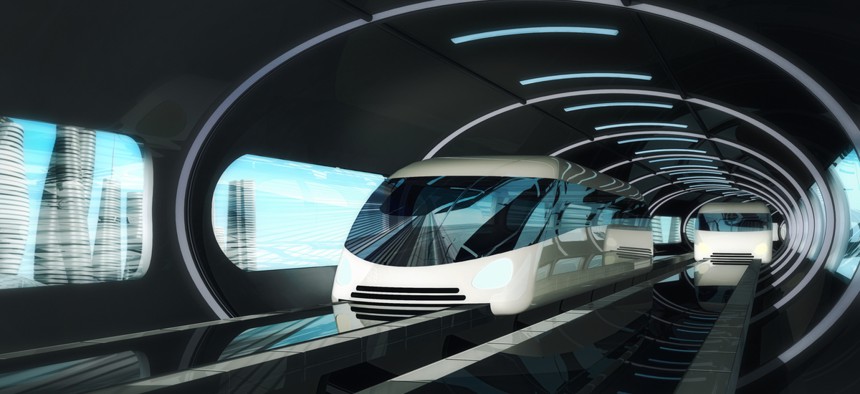Nascent Transportation Council Solicits Insight on How to Boost Emerging Modes and Technologies

andrey_l/Shutterstock
The newly-established internal body aims to help resolve issues around budding tech that doesn’t fit into the department’s existing structures.
The Transportation Department recently launched an internal deliberative body to identify and resolve issues around innovative emerging technologies that may not fit into its existing jurisdiction and regulatory structures—such as hyperloop and autonomous vehicles—and now, the agency wants the public to weigh in on the new entity’s potential efforts.
According to a request for comments published Tuesday in the federal register, Transportation is garnering insight on the projects, topics and issues that should be considered through its Non-Traditional and Emerging Technology Council. “The department is seeking input on how to make the NETT Council work more effectively to prepare for the transportation system of the future,” Transportation Secretary Elaine Chao said in a statement.
Stood up in April, the council is meant to be a single point-of-entry that project sponsors and people working to produce and deploy cutting-edge transportation modes and technologies can access to discuss their plans and proposals, and gain regulatory and operational feedback. Insiders are expected to conduct oversight on those efforts and also develop improved department-wide processes, solutions and best practices for integrating and steering the budding tech.
“Since the Council's inception, innovators and stakeholders have approached the department with concepts and ideas that vary in their stage of development. To ensure that the council is responsive to the needs of the public and industry, the department is interested in hearing from stakeholders and the public as to whether and to what extent the department's existing regulatory construct supports or hinders innovation,” officials note in the solicitation. “The department is also seeking comment on how the NETT Council can better be in a position to support transportation innovation.”
The request poses 14 questions on the topics including: details on existing federal transportation laws or regulations that pose barriers or hinder innovation related to evolving and non-traditional transportation modes; how existing laws should be changed to boost modernization; whether the department should be working directly with any relevant international organizations on the topic; if there should be new standards or codes of conduct put in place to simultaneously support innovation and ensure safety; and from the stakeholders developing new technology, the agency also wants to know the distinct point in development that makes the most sense for them to interface with the NETT Council.
While the questions are “meant to guide commenters,” officials also note that “commenters are invited to provide their views on issues surrounding non-traditional and emerging transportation technologies and other general comments related to this topic.”
The agency will accept feedback for 45 days following the document’s publication.






